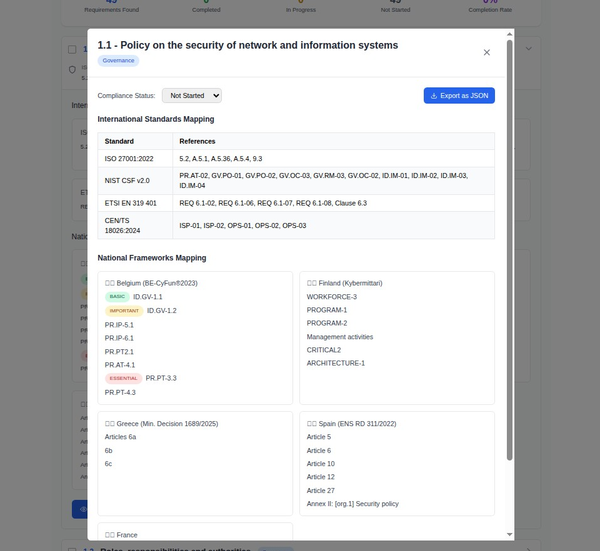Australia Introduces First Standalone Cybersecurity Law to Address Growing Threat Landscape

The Australian government has taken a decisive step to bolster national cybersecurity by introducing the Cyber Security Bill 2024 to Parliament. This new legislation, the country’s first standalone cybersecurity law, is designed to address the growing geopolitical and cyber threats that have placed both citizens and organizations at increased risk. By mandating cybersecurity standards, enhancing incident reporting, and establishing a framework for collaboration between government and critical infrastructure sectors, the Cyber Security Bill 2024 represents a comprehensive approach to strengthening Australia’s cybersecurity resilience.

Key Components of the Cyber Security Bill 2024
The Cyber Security Bill 2024 introduces a range of measures aimed at protecting critical infrastructure and improving cybersecurity across the public and private sectors. These measures include minimum cybersecurity standards for Internet of Things (IoT) devices, mandatory reporting of ransomware payments, and the creation of a Cyber Incident Review Board to investigate major incidents. The bill also seeks to enhance existing provisions under Australia’s Security of Critical Infrastructure (SOCI) Act 2018, simplifying information sharing between industry and government, and improving the government’s capacity to assist in managing the impacts of cybersecurity incidents.

Mandating Cybersecurity Standards for IoT Devices
One of the most significant provisions in the new legislation is the introduction of minimum cybersecurity standards for IoT devices. This move is seen as a critical step in protecting Australian consumers and businesses from vulnerabilities in smart devices, which are increasingly used in homes and industries across the country.
Currently, there are no mandatory cybersecurity standards for smart devices in Australia, which has led to what the government describes as a "fragmented and insufficient" approach to securing IoT technology. The Cyber Security Bill 2024 aims to establish a baseline level of security for all internet-connected devices, such as smart doorbells, watches, and other consumer electronics. These standards will include features like:
- Secure default settings to minimize vulnerabilities from default credentials
- Unique device passwords to prevent unauthorized access
- Regular security updates to ensure devices are protected from emerging threats
Furthermore, the legislation grants the responsible minister the authority to mandate cybersecurity standards for smart devices through Ministerial rules. This flexibility will allow Australia to quickly update its standards to align with international best practices, following a similar approach to the UK’s Product Security and Telecommunications Infrastructure (PSTI) Act.
If businesses fail to comply with the new standards, the government can issue a compliance notice, a stop notice, or even a recall notice to enforce the regulations. This approach ensures that IoT manufacturers and distributors maintain a high level of security and accountability.
Mandatory Reporting of Ransomware Payments
Another key provision of the Cyber Security Bill 2024 is the introduction of a mandatory reporting obligation for ransomware payments made by certain private sector organizations that operate critical infrastructure. This requirement addresses the growing threat of ransomware, which has surged globally and has impacted Australian businesses, healthcare facilities, and government agencies.
Under the new law, any business operating critical infrastructure in Australia that makes a ransomware payment must report the incident to the Australian Signals Directorate (ASD) and the Department of Home Affairs within 72 hours of either making the payment or becoming aware of the payment being made. This reporting obligation aims to provide the government with a clearer picture of the scale of ransomware activity in the country, allowing it to better understand the threat landscape and coordinate responses to cybercriminals.
Failure to comply with this reporting obligation can result in civil penalties, underscoring the seriousness with which the government views the ransomware threat. By enforcing mandatory reporting, the Australian government hopes to reduce the financial incentives for ransomware attackers while improving its ability to track and mitigate cyber extortion efforts.
Creation of the Cyber Incident Review Board
The Cyber Security Bill 2024 will also establish a Cyber Incident Review Board tasked with conducting post-incident reviews of significant cybersecurity breaches. The board will play a crucial role in analyzing major cyber incidents, learning lessons from them, and providing recommendations to prevent similar breaches in the future.
The creation of the review board is in line with international best practices, as many countries have introduced similar mechanisms to improve incident response and resilience. In addition to its investigative role, the board will foster a culture of transparency and collaboration between the public and private sectors, ensuring that both sides work together to address evolving cyber threats.
The legislation includes a ‘limited use’ obligation, which restricts how information shared with the National Cyber Security Coordinator can be used by other government agencies. This provision is designed to ensure that incident data is used appropriately and only for cybersecurity-related purposes, protecting the privacy and confidentiality of affected organizations while enabling government authorities to respond effectively to incidents.
Strengthening the Security of Critical Infrastructure (SOCI) Act 2018
The Cyber Security Bill 2024 also includes provisions to strengthen and simplify existing regulations under the Security of Critical Infrastructure (SOCI) Act 2018. The SOCI Act was originally introduced to safeguard Australia’s critical infrastructure sectors, such as energy, water, telecommunications, and financial services, from both physical and cyber threats. The new bill will implement reforms that:
- Simplify information sharing across industries and government agencies
- Enhance the government’s ability to provide assistance in managing the impact of all-hazards incidents, including cyberattacks
- Improve cooperation between private sector organizations and the government in defending critical infrastructure from cyber threats
These enhancements are crucial as cyberattacks on critical infrastructure have become more frequent and damaging. By facilitating greater collaboration and ensuring the government can provide rapid assistance when needed, the new bill strengthens Australia’s overall resilience against potential disruptions to essential services.
Whole-of-Economy Approach to Cybersecurity
In introducing the Cyber Security Bill 2024 to Parliament on October 9, Tony Burke, Australia’s Minister for Home Affairs, emphasized the need for a whole-of-economy approach to cybersecurity. The legislation provides a framework designed to protect not only critical infrastructure but also the wider economy from emerging cyber threats.
“We need a framework that enables individuals to trust the products they use every day. We need a framework that enhances our ability to counter ransomware and cyber extortion. We need a framework that enhances protections for victims of cyber incidents and encourages them to engage with the government. And we need a framework that enables us to learn lessons from significant cybersecurity incidents so that we can be better prepared going forward,” Burke stated.
The Cyber Security Bill 2024 is also part of Australia’s broader 2023-2030 Australian Cyber Security Strategy, which outlines key initiatives to bolster the country’s defenses against cyberattacks and promote a safer, more secure digital environment. The strategy focuses on enhancing cyber resilience, improving threat detection, and fostering collaboration between public and private sector entities.
A Necessary Legislative Step
Australia’s introduction of the Cyber Security Bill 2024 marks a critical step toward improving the country’s preparedness for the growing cyber threat landscape. With cyberattacks becoming more frequent and sophisticated, particularly those targeting critical infrastructure, the bill provides the legal and regulatory framework necessary to safeguard the digital systems that underpin modern society.
The bill also reflects Australia’s commitment to aligning with international best practices in cybersecurity. By mandating minimum standards for IoT devices, requiring the reporting of ransomware payments, and establishing a Cyber Incident Review Board, the new legislation provides a robust response to the cyber challenges of today and prepares the country for future threats.
Conclusion: Building a More Resilient Australia
As Australia faces an increasingly complex cyber threat landscape, the Cyber Security Bill 2024 provides a comprehensive framework for protecting the nation’s critical infrastructure, digital services, and citizens. By focusing on IoT security, mandatory ransomware reporting, and post-incident reviews, the bill strengthens Australia’s cybersecurity posture and sets the stage for future collaboration between the public and private sectors.
For Australian businesses, especially those responsible for critical infrastructure, the new law presents both challenges and opportunities. While organizations will need to adapt to the new regulatory requirements, compliance will also provide them with a competitive advantage by enhancing their security and resilience in a world where cyber threats are ever-present.
The Cyber Security Bill 2024 underscores the importance of a proactive, whole-of-economy approach to cybersecurity and lays the foundation for a more secure digital future for Australia.







